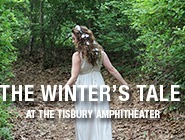
Actors talking Shakespeare
Shakespeare’s “The Winter’s Tale,” produced by the Martha’s Vineyard Playhouse, opened last Thursday, and runs through August 11. You should go. Here’s why.
It’s a great drama with lots of comedy, and plays perfectly at the Tisbury Amphitheater. The casual charm of the rustic thrust stage, surrounded by woods, right by the Tashmoo Overlook, shows this type of bare-bones production to its best advantage. “Stage” might be taking things a bit far, as its floor is organic, as in dirt, but taking in this play, set as it is in this picturesque setting, is perfect summertime activity.
Brooke Hardman Ditchfield, director, has brought her consistently outstanding talents to this script. In a discussion with Ditchfield and four of the actors a few days before the opening, Ditchfield talked about staging Shakespeare: “‘The Winter’s Tale’ is one of Shakespeare’s late romances, all of which have dramatic narratives, elements of tragedy, and plenty of high comedy. ‘The Tempest,’ more well-known, also falls into this category. Contemporary audiences from around 1608 would have known the title ‘The Winter’s Tale’ was a form of an old wives’ tale suitable for a long winter’s night of storytelling. They would know, too, that the story might include mystical elements, dream sequences, and magical passing of time. In these late plays, Shakespeare explores human frailty, heroism, and redemption, and no one does this sort of tragicomic storytelling better.”
Making the play come to life is the trick, and Ditchfield has cast it well. There are no microphones in use, and the setting is rather “dead,” as one says when a space does not project sound easily. These actors, most of whom have worked in the space before, make sure the script’s meaning gets across through diction, emotion, and movement.
Most important in this context, with language that isn’t part of our everyday speech, is diction. Actors talk of slowing down their speech so that the words are clear, but the change in tempo is not noticeable. Current actor training and audience expectations, at times, tend towards “naturalistic” delivery, which is fine on camera, but not so much in a live theater. Marlon Brando, who was a great film actor, starred, early in his career, on Broadway. One night, a friend of Brando’s came backstage and said she couldn’t understand what he was saying. Brando was dismayed. And he fixed it. This cast doesn’t need to fix anything.
Amy Sabin Barrow, who plays Hermione with great sensitivity, explains, “This amphitheater definitely has its challenges. Most of us have worked together before, and Brooke understands the need to cast classically trained actors for work in an outdoor space, especially without the use of microphones. We’re all very aware of drawing on vocal technique, the importance of warm-ups, ability to project while sounding like normal speech and maintaining physical awareness of where our audience is in the space.”
Chelsea McCarthy, playing Paulina with appropriate, resounding indignation, chimes in, “No problem for me, I don’t have an indoor voice.”
Barrow continues, “It’s hard physical work, but it’s extremely gratifying when we get it right, and the technique is invisible.”
“I deconstruct the text, and through technique I find the human experience
that Shakespeare intended,” Paul Padua describes. “The approach is initially mechanical, but as you work the text, Shakespeare finds you, and the emotional choices are clear.” Padua, as Autolycus the fool, understands how to play big and work the room, allowing you to enjoy him and believe him.
Mac Young as Leontes has a huge role in “The Winter’s Tale,” as temping and challenging to play as any of the more well-known Shakespearean leads like Hamlet, Lear, or Iago. Young is spectacularly all over the place, like his character should be, infuriating us, bringing us to tears, and … I’ll stop there, don’t want to spoil the ending.
Young says, “Shakespeare’s language is layered, and can be hard to penetrate. Plus, the sensibility of the 17th century is entirely different to our own cultural norms, and can add to the complexity. As actors, we must illuminate the script, using the elegant way Shakespeare has structured to play, the rhythm of the lines, and the truth each character believes. I think of his work as acrobatic thought.”
McCarthy adds, “What he said!”
Lest you think the pithy McCarthy is a lightweight, let me assure you of the opposite.
As I said, there are plenty of reasons to see “The Winter’s Tale.” Including interpretation of the most famous and rare “stage direction” of all time, “Exit, pursued by a bear.” Stay out of the woods … but check out the Amphitheater.





